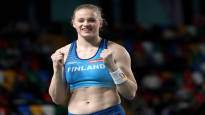The international athletics federation World Athletics (WA) said on Wednesday that it will be the first sports federation to start distributing prize money at the Olympics.
In athletics at the Paris Olympics, prize money is only available for victory, a good 46,000 euros, but in Los Angeles 2028, silver and bronze medalists can also receive prize money.
Finnish member of the board of the International Athletics Federation Antti Pihlakoski says that the historic decision is part of WA’s long-term goal of increasing the income of track and field athletes, so that the sport could appear as a clear career option.
For example, in the Diamond League and the World Cup, prize money has been commonplace for a long time, but the Olympics have traditionally been about fame and glory.
According to Pihlakoski, the decision is not against the Olympic spirit, but against today. The Olympics have become a multibillion-dollar money trap, from which even the winning athletes have not received direct financial benefit. For example, during the years 2017–2021, the Olympics will be held 7.6 billion dollars.
Of course, an Olympic medal can bring you great sponsorship income, and in some societies Olympic winners are valued with, for example, pensions, plots of land or million-dollar prizes.
– It does not apply to all countries and we want the best athletes in athletics to earn money. We wanted to show the way in this direction, says Pihlakoski.
For and against
WA’s prize money decision has divided the sporting world.
Swedish member of the International Olympic Committee Petra Sörling told for SVT that he was surprised by the decision of the International Association of Athletics Federations, which he thinks will cause a debate in sports circles.
– Prize money is an ideological issue. In some sports it is shared, but the Olympics have always been about glory. The amount may not be large for athletics, but for many smaller sports it is. This is a watershed in the sports world, Sörling said.
Sörling surprised the president of WA that he was at the same meeting of international sports federations Sebastian Cohen with, but only read about the decision from the press release.
British five-time Olympic champion in swimming Steve Redgrave told for the Daily Mail that he considers WA’s decision unfair.
– This hits sports that can’t afford something like this quite hard. The decision separates top sports from, for example, swimming, paddling and most martial arts. They simply don’t have the same financial situation, Redgrave, who won gold in five consecutive Olympics from 1984 to 2000, criticized.
Judo’s Olympic hope Martti Puumalainen on the other hand, would not see as unequal a situation in which he, as the Olympic champion, would be left without prize money while an all-rounder would receive a pot of tens of tons.
– It’s a nice amount, but still quite small. Yes, I think the value of the Olympic champion’s title is much greater, Puumalainen told Urheilu.
Should other sports also have an award system similar to athletics at the Olympics?
– It would be nice, but I don’t know if it is… I think the Olympic medals are the thing in the Olympic Games.
The sole ruler of the pole vault Armand Duplantis guessed For Expressenthat the athletics decision affects other sports as well.
– This puts pressure on other sports. Swimming is one of the top sports of the Olympics, you should get something in that too. Athletics is the biggest Olympic sport, so we wanted to do something for the athletes, Duplantis said.
Where does the money come from?
The International Athletics Federation has set aside 2.2 million euros for the prize money of the Paris Olympics. Antti Pihlakoski says that the prize money is covered by the slice paid by the International Olympic Committee (IOC) to the sports federations, which WA receives every four years.
A good economic situation enables money flows to be directed to the winners.
– The fact that we can increase the amount of cash prizes without giving up on other things is based on the fact that the suction of athletics in the World Cup has been quite strong, and the World Cup candidates have been ready to invest money in athletics, Pihjakoski says.
Are the athletes of other sports in an unequal position when, with these prospects, only the Olympic winners in athletics receive prize money from Paris?
– I hope that this will make other sports and the IOC think that the athletes actually make the games, so there is probably reason to think that artists are paid, just like in any show business. Yes, sport is ultimately a certain kind of entertainment, says Pihlakoski.
– The Olympic movement has gotten quite a lot of fat around it and the athletes have not been directly given money for it, so it is probably quite good that this branch is shaken up a bit so that the athletes who actually do the games get their share.
Paris Olympics July 26 – August 11, 2024. broadcasts the competition events on its channels.
